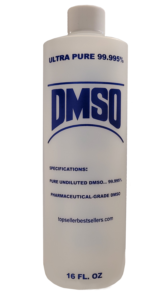DMSO (Dimethyl Sulfoxide) is a colorless, hygroscopic liquid with diverse therapeutic properties. DMSO is a compound with remarkable health-promoting properties, yet its full potential remains largely untapped by the mainstream pharmaceutical industry and the Food and Drug Administration (FDA). Despite its extensive range of therapeutic benefits, DMSO often operates under the radar, employed in only select, specialized situations. This overlooked gem of a natural substance holds the promise of massive health benefits that are quietly transforming lives in various ways, from alleviating chronic pain to addressing complex medical conditions, all while staying relatively underappreciated by conventional medicine.
Discovery and Origin
Dimethyl Sulfoxide (DMSO) traces its origin to the late 19th century when it was first stumbled upon as a byproduct of the kraft process for papermaking from wood pulp. It was during this time that Russian chemist Alexander Zaytsev synthesized it through the oxidation of dimethyl sulfide, another byproduct of the kraft process. Zaytsev’s synthesis method forms the foundation of the manufacturing process still in use today. This unassuming byproduct turned out to be a remarkable discovery, setting the stage for DMSO’s versatile applications in science, medicine, and industry, thanks to its unique properties and unparalleled ability to permeate biological membranes.
Using DMSO as a Targeted Injection-free Delivery System
DMSO possesses a remarkable ability to seamlessly blend with various compounds, making it an exceptional transfer agent. This distinctive characteristic enables DMSO to act as a vehicle for transporting therapeutic mixtures through the body’s layers, including skin, tissues, muscles, and even bone, with surgical precision. Unlike conventional administration methods that necessitate needles for penetration, DMSO eliminates the need for invasive procedures. Instead, it smoothly permeates these barriers, ensuring that the mixture reaches the intended location effectively. This remarkable feature has garnered significant attention and admiration in medical and therapeutic circles, as it offers a non-invasive yet highly efficient means of delivering treatments precisely where they are needed, enhancing the potential for targeted, minimally intrusive therapies.
Common Uses
DMSO is known for its versatility and is used to address a wide range of health concerns, including:
- Inflammatory diseases
- Joint pain relief
- Cancer-related pain
- Gastrointestinal disorders
- Migraines
- Skin conditions like psoriasis and eczema
- Tendonitis
- Autoimmune disorders
- Arthritis (both osteoarthritis and rheumatoid arthritis)
- Muscle spasms
- Burns and scar tissue
- Complex Regional Pain Syndrome (CRPS)
- Shingles
- Interstitial Cystitis
- Scleroderma
- Hemorrhoids
- Ulcerative Colitis
- Diabetic Neuropathy pain
- Varicose and Spider veins
- Furuncular otitis
- Acute Respiratory Distress Syndrome
- General stiffness and soreness
Therapeutic Properties
DMSO boasts 16 significant therapeutic properties, including,
- Blocking pain signals in nonmyelinated nerve fibers
- Anti-inflammatory effects
- Bacteriostatic, fungistatic, and virostatic properties
- Enhancing drug transport across biological membranes
- Reducing platelet thrombi in blood vessels
- Regulating cardiac contractility
- Stimulating prostaglandin synthesis
- Improving antifungal and antibacterial agent effectiveness
- Acting as a vasodilator
- Inhibiting cholinesterase release
- Softening collagen
- Scavenging hydroxyl free radicals
- Enhancing various immune responses
- Serving as a potent diuretic
- Promoting interferon production
- Accelerating wound healing
DMSO vs. Traditional Painkillers
DMSO offers advantages over traditional painkillers.
-
- It can be applied topically, avoiding gastrointestinal irritation.
- It controls pain and inflammation through multiple mechanisms.
- DMSO is less likely to cause addiction or overdose risks.
Safety and Usage
While generally safe, individuals should consult healthcare professionals, especially if taking other medications. DMSO is available in various grades, with 99.99% Pure Pharmaceutical Grade DMSO suitable for human use.
Availability
DMSO is commercially available in the United States, both in industrial-grade forms for animals and pharmaceutical-grade for humans.
Currently
In recent years, Dimethyl Sulfoxide (DMSO) has been steadily gaining traction among holistic practitioners, natural alternative specialists, proponents of folk medicine, and even off-grid preppers. This growing interest can be attributed to the remarkable array of potential health benefits associated with DMSO, which range from pain relief to anti-inflammatory properties.
Holistic practitioners appreciate its versatility as a natural remedy, while natural alternative specialists explore its potential in complementary therapies. Folk medicine traditions, which often rely on time-tested remedies, have found DMSO to be a valuable addition to their arsenal.
Additionally, off-grid preppers, who prioritize self-reliance and preparedness, have recognized DMSO as a versatile tool with various applications, both for health and beyond, as it is increasingly being added to emergency kits and bug out bags. This surge in interest reflects the broadening recognition of DMSO’s potential in diverse circles seeking natural, effective solutions to health challenges and beyond.
Future Potential
Ongoing research aims to further understand DMSO’s effectiveness for various medical conditions. Currently, DMSO is FDA-approved for interstitial cystitis.
Conclusion
DMSO offers a natural, versatile, and safe alternative for pain relief and addressing various medical conditions, with potential for continued discoveries in its medical applications.






Leave a Reply